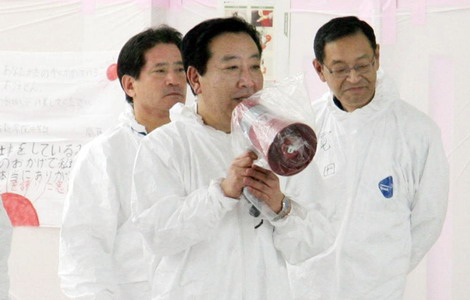Project to stop officials from fleeing
Updated: 2011-09-09 07:20
By Yan Jie and Zhang Yan (China Daily)
|
|||||||||||
BEIJING - Ten Chinese provinces and municipalities have launched a one-year pilot program to prevent corrupt or undisciplined officials from fleeing the country, the Ministry of Supervision said in a press release.
They will also try to have fugitives returned from abroad.
"Authorities must improve their work to prevent escapes and to catch fugitives abroad," Gan Yisheng, deputy secretary of the Central Commission for Discipline Inspection, said at an earlier meeting launching the program.
It will run until August next year.
China has pulled off several high-profile extraditions of officials or government employees who were accused of bribery and embezzlement in the past few years, said Gan.
Other suspects have been handed back to China or persuaded to return, he added.
"The procedures to prevent escapes must be stressed," Hou Chengxin, deputy secretary of the discipline inspection commission in Nanjing, capital of Jiangsu province, told China Daily.
For instance, applications by officials for overseas trips must be strictly reviewed, said Hou.
In China, officials and government employees are required to register their private overseas trips with the authorities as part of government tactics to prevent them from fleeing the country. Relevant authorities hold their passports while the cross-border movement of funds is monitored.
Authorities involved in the program are the provincial discipline inspection commissions, personnel departments, prosecutors, foreign affairs offices and public security departments.
The pilot will cover the provinces of Heilongjiang, Jiangsu, Zhejiang, Fujian, Jiangxi, Shandong, Henan, Guangdong and Yunnan, and the municipality of Shanghai.
"This will help motivate the local governments' initiatives and regulate them to participate in supervising and reporting relevant cases involved with corrupt officials fleeing overseas," Huang Feng, professor at the criminal law scientific research institute of Beijing Normal University, said on Thursday.
In the past, it was only the central government authorities that directly handled these cases, he said.
However, in most of the cases, it was the local authorities that investigated and collected evidence, or prepared case materials for central authorities.
"But sometimes, they couldn't provide the complete case materials, or they even concealed or didn't report cases to the central authorities due to non-standard behavior and their lack of professional knowledge," Huang said.
Last year in Guangdong province, the provincial discipline inspection commission, high people's court, procuratorate, public security department, justice department and foreign affairs office teamed up to develop a mechanism to handle corruption cases overseas.
Wang Huazhong, Zheng Cai-xiong contributed to this story.
- China to help firms investing abroad
- Foreign brands accused of cheating
- Singer apologizes for son's attack
- Babies born abroad may trigger fines
- Ministry: China to further facilitate investment
- State Council demands spill probe
- Little role of NATO in anti-terrorism
- Internet major source of rumors: poll
Hot Topics
Libya conflict, Gaddafi, Oil spill, Palace Museum scandal, Inflation, Japan's new PM, Trapped miners, Mooncake tax, Weekly photos, Hurricane Irene
Editor's Picks

|

|

|

|

|

|







